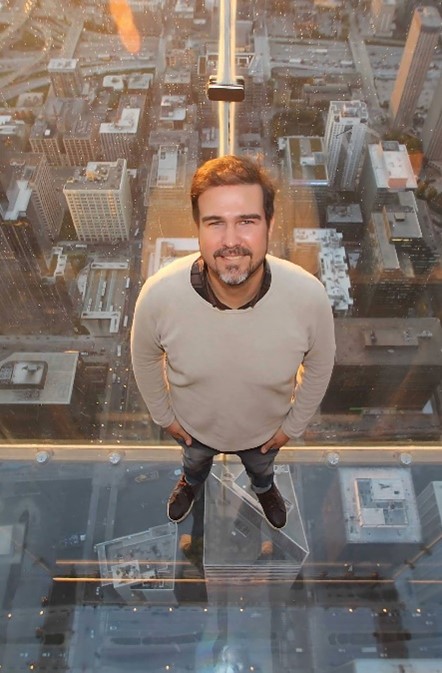Mosquitos and Us: The Intricate Interplay Between Human History and the Transmission of Mosquito-Borne Viruses
-
Roenick P. Olmo, Centre national de la recherche scientifique
Coach House, Green College, UBC and livestreamed
Tuesday, September 24, 5-6:30 pm, with reception to followin the series
French Scientist in Residence at Green College -
Mosquitoes are major vectors for many significant viral diseases in humans. Aedes mosquitoes, particularly the Aedes aegypti species, can transmit viruses such as dengue, Zika, and chikungunya, causing millions of infections worldwide. This species originated in Africa, where the Ae. aegypti aegypti subspecies developed an affinity for humans before spreading to nearly all continents. Viruses have co-evolved with mosquitoes, spreading alongside them as the mosquitoes expanded their geographic range. The spread of mosquito-borne viruses is driven by a complex interplay of biological, environmental, and social factors, including mosquito traits, climate, and environmental interactions. In this talk, Roenick Olmo will discuss how mosquito traits have been shaped by historical patterns and societal dynamics, and the resulting impacts on disease spread. He will also explore strategies to mitigate the impact of human activities on the transmission and expansion of mosquito-borne viruses, offering insights into future challenges and opportunities for research and public health intervention.
This event is co-sponsored with the Cultural and Scientific Office of the French Embassy in Canada.
 Dr. Roenick P. Olmo earned his PhD in bioinformatics from the Universidade Federal de Minas Gerais (Belo Horizonte, Brazil) in 2015, where he used molecular biology, virology, and bioinformatics tools to study antiviral innate immune reponses in the vector mosquito Aedes aegypti. His work primarily centred on understanding why some mosquitoes are naturally resistant to being infected with medically important viruses that cause dengue, Zika, and Chikungunya fever. Later, Roenick embarked on a postdoctoral experience in Strasbourg, France, at the Institut de Biologie Moléculaire et Cellulaire (IBMC), were he investigated how insect-specific viruses (ISVs)—a distinct category of viruses that infects exclusively insects—can alter the transmission of medically important viruses during co-infection in mosquitoes. From October, 2023, Roenick has joined the CNRS UPR9022 unit at the IBMC/Strasbourg as associate researcher (chargé de recherche CNRS) and his ongoing projects are geared towards connecting the intricate molecular mechanisms of natural resistance to virus infections in mosquitoes, the link between mosquito anthropophilic behavior and immunity, and the development of strategies to curb transmission of mosquito-borne pathogens.
Dr. Roenick P. Olmo earned his PhD in bioinformatics from the Universidade Federal de Minas Gerais (Belo Horizonte, Brazil) in 2015, where he used molecular biology, virology, and bioinformatics tools to study antiviral innate immune reponses in the vector mosquito Aedes aegypti. His work primarily centred on understanding why some mosquitoes are naturally resistant to being infected with medically important viruses that cause dengue, Zika, and Chikungunya fever. Later, Roenick embarked on a postdoctoral experience in Strasbourg, France, at the Institut de Biologie Moléculaire et Cellulaire (IBMC), were he investigated how insect-specific viruses (ISVs)—a distinct category of viruses that infects exclusively insects—can alter the transmission of medically important viruses during co-infection in mosquitoes. From October, 2023, Roenick has joined the CNRS UPR9022 unit at the IBMC/Strasbourg as associate researcher (chargé de recherche CNRS) and his ongoing projects are geared towards connecting the intricate molecular mechanisms of natural resistance to virus infections in mosquitoes, the link between mosquito anthropophilic behavior and immunity, and the development of strategies to curb transmission of mosquito-borne pathogens.At UBC, together with the lab of Dr. Benjamin Matthews (Department of Zoology), Roenick aims to study the connection between the mosquito olfactory system and immunity, focusing on genetic changes that led to anthropophilia in the domestic Ae. aegypti aegypti and consequently the capacity to transmit viruses (a.k.a. vector competence). They will integrate the expertise of the Matthews laboratory in mosquito neurophysiology and genetics, together with his expertise in mosquito antiviral immunity, to identify and target relevant genes within the olfactory system that might affect immunity and antiviral responses in mosquitoes. This work will shed light in the connection between olphaction and immunity, and will certainly contribute to the development of new strategies to control arbovirus transmission by Aedes mosquitoes. Roenick is in residence at Green College in the fall semester of 2024.

-
Unless otherwise noted, all of our lectures are free to attend and do not require registration.
Custom Lecture Fields
|